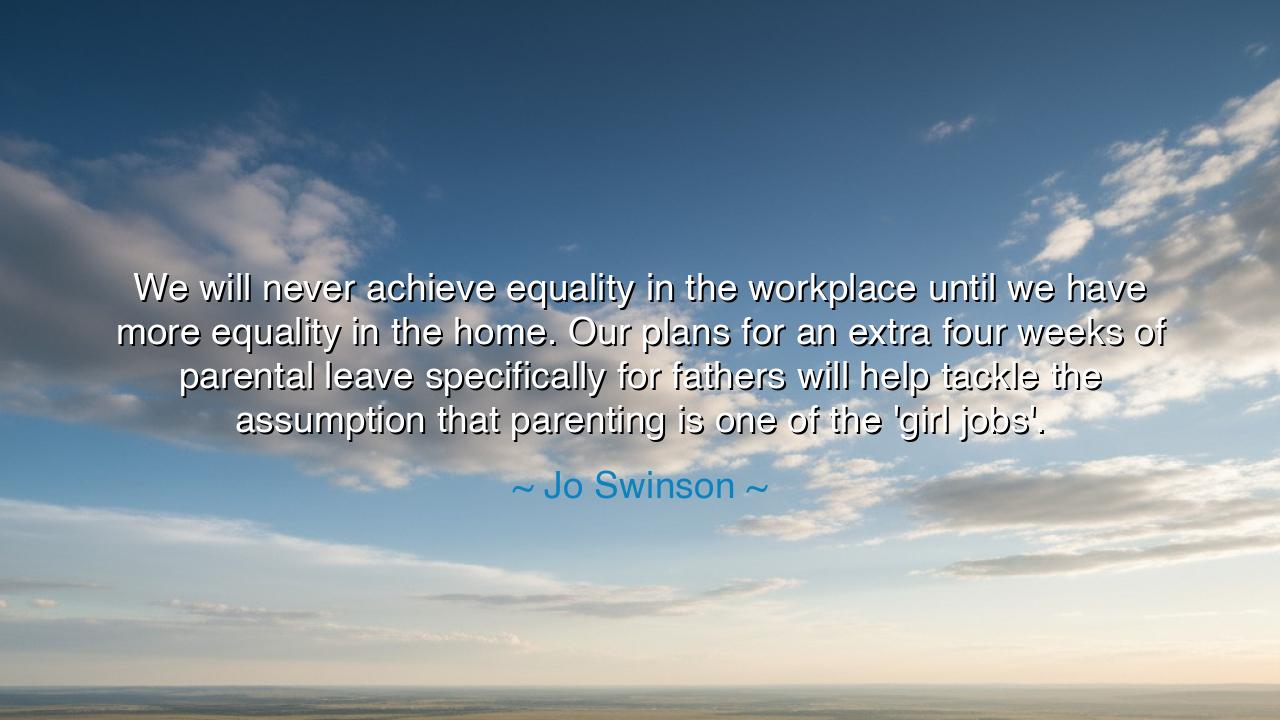
We will never achieve equality in the workplace until we have
We will never achieve equality in the workplace until we have more equality in the home. Our plans for an extra four weeks of parental leave specifically for fathers will help tackle the assumption that parenting is one of the 'girl jobs'.






Hear now, O Children of the Future, the words of Jo Swinson, who speaks with clarity and purpose: "We will never achieve equality in the workplace until we have more equality in the home. Our plans for an extra four weeks of parental leave specifically for fathers will help tackle the assumption that parenting is one of the 'girl jobs.'" These words are not mere observations; they are a call to action, an urgent reminder that the fight for gender equality begins not just in public spheres but within the walls of our homes. Swinson’s words strike at the very heart of societal expectations, challenging the deeply ingrained belief that parenting is a responsibility that belongs primarily to women. In truth, the home is where the seeds of equality must first be planted, for it is in the most intimate and personal of spaces that the shapes of power and gender roles are first formed.
In the ancient world, the roles of men and women were clearly defined. In Athens, the heart of Greek democracy, women were largely confined to the home, while men held dominion over public life. The philosopher Aristotle posited that the roles of men and women were ordained by nature, and that men were suited for public life and reason, while women were best suited for domestic duties. In Rome, this divide was even more pronounced, with the domus, or household, being the sphere of women, while men engaged in politics, war, and public affairs. Yet even within these structures, there were whispers of change. The power of women in the private sphere, the strength they held in shaping the next generation, was not lost on philosophers and thinkers who recognized that true equality would never be achieved until the very roles and expectations within the home were challenged.
Jo Swinson’s words, however, suggest a new path forward—one that moves beyond the limits of these ancient views. Her call for fathers to take on a more equal role in parenting is a direct challenge to the belief that child-rearing is primarily a woman's task. Parental leave, she suggests, is not just a matter of supporting mothers but of redefining the roles of fathers in the home, thereby laying the foundation for a more equal society. By encouraging fathers to take equal responsibility for child-rearing, Swinson is calling for a radical shift in how we view family life and work-life balance, just as the ancient philosophers and leaders once called for radical shifts in how societies should be governed.
Consider, O Children, the story of the Suffragette movement, which fought for the right of women to participate equally in public life. The fight for women’s suffrage was not just about the right to vote but about the recognition of women as equal partners in the creation of society’s laws and rules. Women like Emmeline Pankhurst and Susan B. Anthony knew that true equality could not be achieved unless the roles of women were recognized beyond the private sphere. They pushed the boundaries of what was socially acceptable, demanding that women be treated as full citizens with the right to shape society. Similarly, the fight for equality in the home is a continuation of this struggle. The belief that parenting is one of the ‘girl jobs’ must be dismantled if we are to create a world where men and women share the burden of family life equally.
In the modern age, we see that gender roles in the home still remain largely defined by the past. Despite advances in gender equality in the workplace, the assumption that women are the primary caregivers in the family continues to dominate. But, as Swinson rightly points out, if we are to achieve true equality in the workplace, we must first redefine the roles within the home. Equal parental leave is a small but powerful step toward breaking down the barriers that have kept women in the shadows of the family. It is a call to fathers to step forward, not just as providers but as partners in every sense of the word. This shift is not only beneficial for women but for men as well, who will find fulfillment and balance in a life that is more integrated between family and career.
The lesson, O Children, is this: True equality cannot exist in any sphere—work, politics, or society—until it is first practiced in the most personal spaces of our lives. Swinson’s message is a call to not only recognize equality but to actively foster it within our homes. The roles we assign to men and women in the domestic sphere have lasting consequences for how we structure power in every other aspect of life. By redefining the roles within the home, we can create a society where workplace equality becomes a natural extension of what we practice in our personal lives.
In your own life, take this truth to heart: Challenge the assumptions that dictate the roles of men and women, particularly in the family. Seek equality at home, where it begins. Encourage fathers to take on equal responsibilities, and mothers to claim equal space in their careers. Only when we act on these values will the world outside the home reflect the same principles of equality. Respect your partner and support each other in all aspects of life, recognizing that the work you do within your home is as valuable as any work done in the public sphere. Foster a world where both parenting and career are shared equally, and where gender equality is not a distant ideal but a living, breathing reality.






AAdministratorAdministrator
Welcome, honored guests. Please leave a comment, we will respond soon